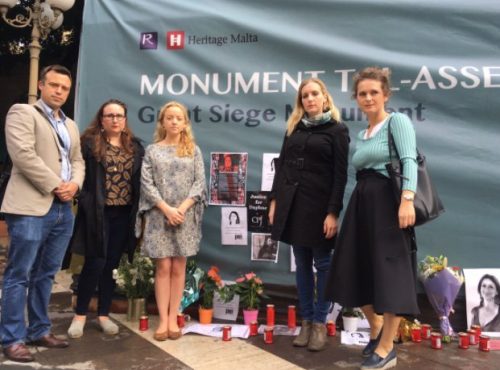This blogpost, written by Nik Williams the Project Manager of Scottish PEN commemorates the one year anniversary of the murder of Maltese journalist, Daphne Caruana Galizia.
Last week an international delegation of rights organisations including PEN International, Reporters Without Borders, the Committee to Protect Journalists, the European Centre for Press and Media Freedom and the International Press Institute travelled to Malta to meet with the Maltese Prime Minister, Joseph Muscat to call for an independent judicial public inquiry into the brutal murder of investigative journalist, Daphne Caruana Galizia that took place a year today. As part of the visit, the delegates laid tributes to Daphne at the Great Siege Monument, a location that has become an informal shrine to her. But the following morning the tributes were gone, removed by the Maltese authorities under the cover of night. This is the most recent of a number of public memorials and tributes that have spontaneously popped up across Malta and the capital city, Valletta that met the same fate; the state removing any trace of the public outpouring of support, solidarity and affection towards the ground-breaking journalist who dedicated her life to exposing corruption and informing the public.

The delegation to Malta with their tribute to Daphne Caruana Galizia, which was removed the morning after
Daphne Caruana Galizia was murdered by a bomb planted in her car on the outskirts of Bidnija. In December 2017, ten people were arrested in connection to the killing, with three of them eventually charged with the killing. But like the shooting of Russian journalist, Anna Politkovskaya in 2006 in the elevator of her apartment block in central Moscow, a year following Daphne’s murder we know nothing of the people who ordered or orchestrated the killing. To ensure journalists are free to continue their work free from the risks of violence, censorship or imprisonment we need to challenge institutional impunity that restricts calls for justice and robust investigations into the deaths of journalists like Daphne Caruana Galizia and Anna Politkovskaya. According to UNESCO, nine in ten cases of killed journalists remain unresolved and this does little to reassure journalists that they can continue their vital public. In Malta the first step to address this would be to listen to her family and the international PEN community to call for an independent judicial public inquiry. To properly protect free expression and press freedom we need to be able to ask questions and scrutinise evidence to demonstrate that the law protects journalists as it should protect everyone else.
2017 and 2018 have been dark years for press freedom in the EU. Four journalists, including Daphne Caruana Galizia have been killed in these two years in Europe, including the murder of Danish journalist, Kim Wall in a submarine off the coast of Copenhagen; in Slovakia, journalist Jan Kuciak was shot dead alongside his fiancé, Martina Kusnirova; and TV journalist Viktoria Marinova was raped and killed in Bulgaria. But beyond Europe, the global picture is no better. Since 1992, according to the Committee to Protect Journalists, 1,944 journalists and media workers have been killed (both motives confirmed and unconfirmed); and in 2015, according to Deutsche Welle, 1,054 authors were attacked, imprisoned, tortured or killed. The situation appears to be worsening as, in 2017, according to the World Press Freedom Index, compiled by Reporters Without Borders, “the [press freedom] situation has worsened in nearly two thirds (62.2%) of the 180 countries in the index”.
At a time when US President, Donald Trump calls journalists the ‘enemy of the people’, a term then used by a man who threatened to kill employees of the Boston Globe; Turkish President Recep Tayyip Erdogan has imprisoned hundreds of journalists, teachers, academics and writers; Eritrea still has no privately owned media outlets after a number of editors or owners of private newspaper have been imprisoned since 2001; and Wa Lone and Kyaw Soe Oo have been arrested and imprisoned in Myanmar for their coverage of the military crackdown on the Rohingya people, the international community needs to do more take the necessary steps to protect journalists, ensuring they can undermine state secrecy, challenge consolidated power and empower the public to make informed decisions.
At PEN International Congress in Pune, last month, Scottish PEN, alongside PEN Netherlands put forward a motion on the situation in Malta to call for great protections for writers, legal reforms to improve law and establish robust judicial processes to investigate the killing of Daphne Caruana Galicia and the death threats received by human rights defenders and journalists, Tina Urso and Caroline Muscat. These are the minimum next steps towards ensuring journalists and activists are free to continue their work and that free expression in Malta is adequately protected.
Until these changes are made, if you lose faith in the poisonous environment for journalists, the inability of journalists to work free from threats of violence and the climate of impunity that critically devalues the rule of law, return to the images of the Maltese people leaving flowers, candles, handwritten notes and photographs remembering Daphne Caruana Galizia and the principles she championed; transparency, accountability and openness. But until the Maltese authorities stop removing these impromptu memorials, we only have the digital archive to remind ourselves of this visible public support for journalism as a vital underpinning of Maltese democracy. But the memorials did happen, the Maltese public have demonstrated themselves to be better custodians of Daphne’s memory than the country’s leaders and there is nothing the state can do to change that, however many tributes they remove.
The post Daphne’s Legacy appeared first on Scottish PEN.